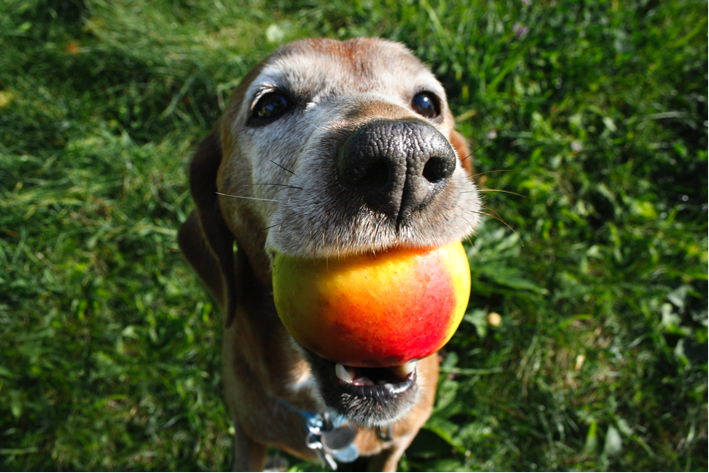
Summer is officially upon us, which means tropical fruits are finally in season. I look forward to this time of year as I get to enjoy one of my favorite snacks, mangoes! Being accompanied by my trusty canine companion in most endeavors, I often wonder if it is acceptable to share some of my beloved fruit with my dog.
Rather than give my dog a little and try the ‘wait and see’ method, I decided to conduct some research and decide for myself if mango is a safe treat for my dog.
Verdict: Raw mango, in moderation, is a welcome addition to any dog’s diet!
When given in moderation, raw mango can provide numerous health benefits to your dog. The only prerequisite for canine consumption is a thorough washing and a removal of the pit. The skin is non-toxic, and therefore a non-issue.
Benefits
Lots of vitamins and minerals
In addition to being absolutely delicious, mangoes are an excellent source of vitamins C, A, B6, E, and K. Mangoes are also rich in minerals potassium, magnesium, and calcium.
Cancer prevention
Mangoes contain loads of polyphenols, naturally occurring compounds with antioxidant properties hailed for their cancer-fighting abilities.
In 2014, scientists at Texas A&M researched if the polyphenols in mangoes were effective against fighting breast cancer cells, with positive results. The scientists discovered that mango polyphenols exert anti-inflammatory properties as well.
Flavonoids alpha-carotene and beta-carotene, naturally occurring botanical compounds found in mangoes, also attribute to the fruit’s cancer fighting ability.
Eye and skin health
Vitamin A is essential to bone, eye, and skin health. Mangoes, rich in vitamin A, can assist in curing skin conditions, as well as improving your dog’s coat.
Vitamin A deficiency can lead to poor vision and muscle weakness. Check your dog food’s ingredients to see if vitamin A is being supplemented. If not, mangoes may provide an excellent source of vitamin A.
Brain health
Vitamin B6, along with glutamine acid, are nutrients provided by mangoes that help improve neurotransmitter function in the brain, which will in turn help improve your dog’s memory and concentration.
High fiber, healthy heart
Mangoes’ high fiber content may lead one to believe that it promotes regular bowel movements and a healthy digestive system. While that is true, regular fiber intake also leads to a healthy heart.
Fiber has the ability to lower cholesterol and blood pressure, as well as to protect against heart diseases, strokes, and diabetes. Mangoes can assist in maintaining healthy heart functions and also a healthy weight.
Antioxidants
Mangoes are packed with antioxidants, which help keep diseases away by boosting your dog’s immune functions. Antioxidants provide numerous other benefits to the overall health of your dog, and even assist in the cancer fight previously discussed.
Things to consider
Natural fructose
Mangoes have a high concentration of natural fructose, an organic sugar much healthier than the highly processed sugars that lead to rapid weight gain and diabetes. Regardless, dog’s systems are not engineered to digest large quantities of sugar, so large consumption could lead to an upset stomach or diarrhea.
A good practice is to begin by only giving your pup a slice or two of mango, then to wait and see if it has any negative reactions before continuing consumption. Medium and large dogs may be able to digest a whole mango or even two without any stomach discomfort, while smaller breeds should most likely be limited to only a few slices.
Frozen or fresh?
Always purchase fresh mango to provide the most nutrients to your dog, and organic if possible in order to avoid feeding your dog any dangerous pesticides.
Frozen and other pre-packaged forms of mango are often absent of many of the nutrients that make mango such a great snack in the first place. They are also often given added sugar and packaged with sugary syrup that tend not to agree with dogs’ stomachs.
Toxic pit
All mangoes contain a pit in the center that should always be removed before allowing your dog to snack on any part of the fruit. The pit can become a serious choking hazard or intestinal blockage. The mango pit also contains a small amount of cyanide, which is probably not enough to prove toxic to your dog, but is still an added threat.
If your dog ingests a mango pit, the pit of another fruit, or any substance that you believe may be toxic, contact your vet immediately to decide the best course of action to take.
